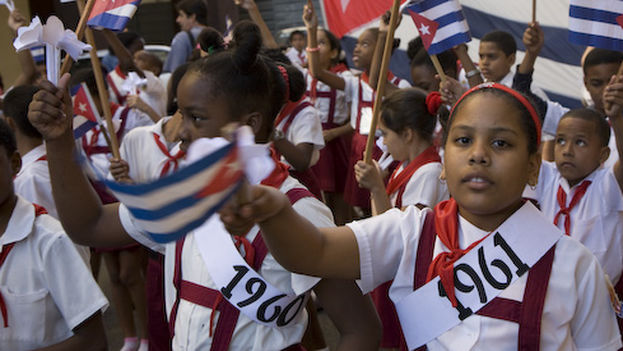
![]() 14ymedio, Pedro Campos, Miami, 12 August 2017 — The Government of the Castro brothers has always maintained that their fundamental social achievements have been “free” health and education, available to all people, which became an international calling card, to try to counter criticism of their massive, flagrant and systematic violations of the political, civil and economic rights of the Cuban people and, in passing, to seek outside influence and obtain economic benefits.
14ymedio, Pedro Campos, Miami, 12 August 2017 — The Government of the Castro brothers has always maintained that their fundamental social achievements have been “free” health and education, available to all people, which became an international calling card, to try to counter criticism of their massive, flagrant and systematic violations of the political, civil and economic rights of the Cuban people and, in passing, to seek outside influence and obtain economic benefits.
That these achievements have not been “free” is more than proven by the fact that the regime has never been able to hide that it appropriates the results of the production of all the state enterprises, the majority of the country, and it deprives employees of most of their salaries. Everyone knows that Cuba, along with Venezuela, has the lowest minimum ($10) and average ($23) monthly salaries in Latin America.
Today, although Cuba has more doctors per inhabitant than any other country in the region, the truth is that more than 50,000 of them, particularly the specialists, are carrying out “missions” abroad. In addition, the conditions and technical resources of neighborhoods clinics, polyclinics and hospitals, which serve the population, do not support stable and quality services, while appointments for exams, admittance to a hospital or surgery can come when the patient is already beyond hope.
A very different situation is presented by the clinics and special hospitals for the top leaders and for the rest of the high military and political bureaucracy that is attended in exclusive facilities, such as the clinic for Security Personnel, the CIMEQ Hospital and some floors of the Hermanos Ameijeiras National Hospital. Another privileged segment is foreigners who pay with foreign currency and who are seen at the Cira Garcia Clinic, all in Havana.
With regard to education, the material situation of primary and secondary schools and higher education institutions is deplorable; they do not have the necessary materials for an average international quality education. Due to the low salaries in the teaching profession, many educational institutions at all levels never have a complete team of teachers. Worst of all, since there is no internet access, modern education, which in most Latin American countries is based on this medium, is practically absent, with only limited availability in universities.
But most importantly, the fundamental, undeclared goals of the “free” health and education services are not to maintain a healthy and educated population capable of meeting life needs. Rather, the first goal is to try to guarantee a working population with a high technical and professional level and in good health that can be exploited in state-owned enterprises and international services, particularly medical services, which bring in foreign currency for the Cuban government. Secondly, the goal is to guarantee, through this patronage blackmail, a people who are committed to continuing to thank the “revolutionary government” for those benefits.
State-ownership, which is now predominant, until recently controlled all sources of labor and income, except for the exploitation of the approximately 20% of land in private hands. That situation has changed, but still today most of the workforce is engaged in state, military and para-state enterprises.
Nevertheless, the systematic deterioration of the health and educations services, as a result of the system’s inability to produce and manage resources, worsened since the fall of the USSR and the “socialist camp,” which aid from Venezuela is not making up for, has generated corruption and widespread discontent in the population.
Another important result of this deterioration is that the most vulnerable sectors such as the elderly, single mothers and the disabled have faced large cuts in the social assistance system, precisely because they contribute the least to the state coffers.
Such that, today, it is no longer even possible for the system to guarantee the control of a prepared and healthy labor force, to hyper-exploit in the generalized slavery frameworks of state-socialism, nor to guarantee the support of the majority of the population for the “free” services. And the state’s international goals are also affected since the countries receiving Cuban doctors are diminishing with the fall of the populist-state wave in Latin America and because, as the Cuban reality becomes better known abroad, there is more rejection.
If this is how “fundamental achievements” perform, we can imagine how the remainder do.
